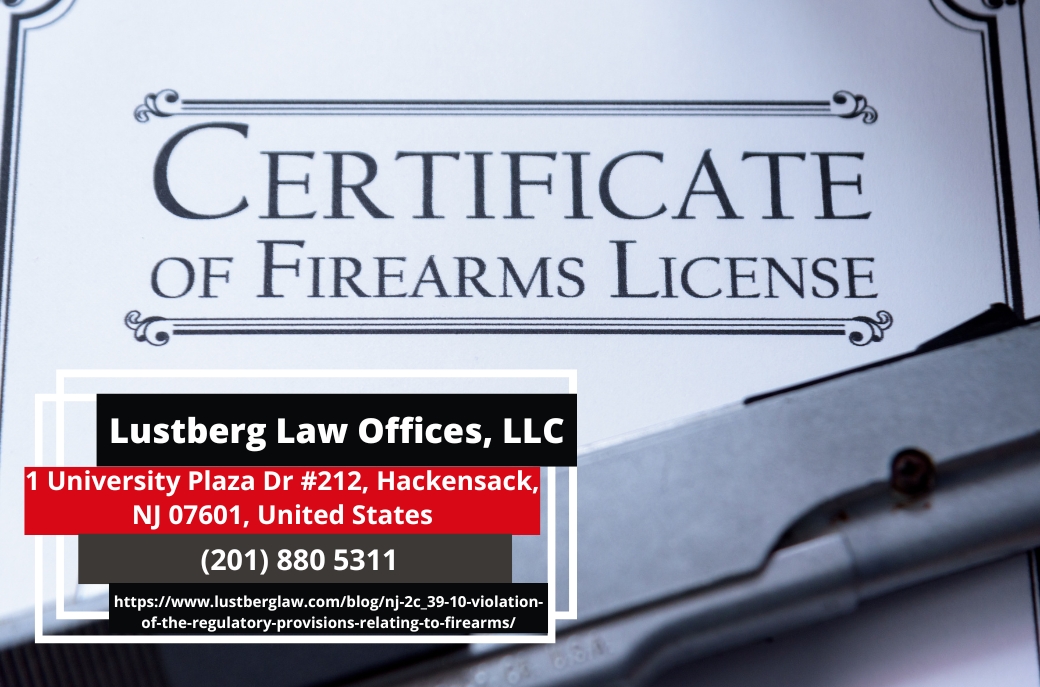New Jersey gun crime lawyer Adam M. Lustberg (https://www.lustberglaw.com/blog/nj-2c_39-10-violation-of-the-regulatory-provisions-relating-to-firearms/) provides important insights into NJ 2C:39-10, a statute that governs violations of the regulatory provisions relating to firearms in the state. In a recent blog post published by Lustberg Law Offices, LLC, Lustberg details how this section of New Jersey's criminal code targets actions that may not involve direct firearm misuse but still carry serious legal consequences. These include providing false information on firearm applications, failing to comply with licensing rules, and improperly transferring weapons.
The New Jersey gun crime lawyer explains that N.J.S.A. 2C:39-10 is often informally called the “falsification” statute. It emphasizes administrative compliance over misuse and serves as a framework to maintain integrity within the state's gun control system. Lustberg outlines that offenses under this law can range from third- and fourth-degree crimes to disorderly persons offenses, all of which carry potential prison time, hefty fines, and lasting repercussions.
As a New Jersey gun crime lawyer, Adam M. Lustberg makes it clear that the law applies to both individuals and firearm dealers. It penalizes not just the false statements on applications but also illegal transfers to underage individuals, failures in mandatory reporting, and improper conduct by licensed dealers. “This law is not just about criminal misuse of firearms—it’s about maintaining transparency and accountability in every aspect of gun ownership and regulation,” Lustberg notes.
One key area discussed is subsection (c), which focuses on providing false details on applications for firearm permits or ID cards. This is considered a third-degree crime and is punishable by up to five years in prison and fines reaching $15,000. Another critical section includes subsections (e) and (f), which address the illegal transfer of firearms to individuals under 18 or handguns to those under 21. These violations can escalate to second-degree felonies with mandatory minimum prison sentences.
Lustberg also highlights subsection (a), which concerns firearm dealers and their responsibility to follow licensing and record-keeping rules. Violations here may result in fourth-degree criminal charges or disorderly persons offenses, depending on the specific breach. Selling a firearm without a proper license or failing to maintain transaction logs are examples cited that could attract penalties ranging from six months to 18 months in prison and fines up to $10,000.
In the article, Lustberg provides further context by noting that 2C:39-10 works in tandem with other firearm laws. For instance, providing false information may also lead to obstruction charges under N.J.S.A. 2C:29-1, and fraudulent firearm acquisition can escalate to unlawful possession under N.J.S.A. 2C:39-5.
The article also covers available defenses. Lustberg explains that these cases often revolve around regulatory breaches, meaning courts may weigh mitigating circumstances like lack of intent or honest mistakes. For instance, omitting a past conviction unintentionally or misunderstanding a question on an application form could serve as a basis to challenge the charge. “Demonstrating a lack of intent can lead to reduced charges or dismissal,” he explains.
Other legal defenses discussed include challenging the sufficiency of evidence, invoking statutory exceptions such as supervised youth hunting or target shooting, and raising procedural errors committed by law enforcement during investigation. The possibility of Pre-Trial Intervention (PTI) is also raised, particularly for first-time offenders, as a way to avoid a criminal record if the program is successfully completed.
Lustberg underscores the seriousness of facing a charge under 2C:39-10, as even procedural missteps can lead to a permanent criminal record and loss of firearm rights. These penalties can have a profound impact on a person’s ability to find employment or pass background checks. Still, he emphasizes that understanding the statute and responding quickly can help defendants find viable legal paths forward.
NJ 2C:39-10 represents a detailed and far-reaching part of New Jersey’s firearm laws, with penalties targeting those who fail to comply with both minor and significant regulatory mandates. Adam M. Lustberg makes it clear that anyone facing such charges must approach the situation with care and seek guidance grounded in state firearm law.
Violations of NJ 2C:39-10 are more than technical errors, they are treated as serious breaches of public safety. Anyone charged under this statute should understand their legal standing and take immediate steps to protect their rights and future opportunities.
Lustberg Law Offices, LLC provides legal support to individuals dealing with NJ 2C:39-10 charges. The team reviews the facts, identifies defenses, and offers representation to minimize the consequences. Legal options may include negotiations, PTI programs, or building a defense around lack of intent or improper procedure by authorities.
About Lustberg Law Offices, LLC:
Lustberg Law Offices, LLC, led by Adam M. Lustberg, represents clients across New Jersey in criminal matters, including those involving firearm regulations. The firm handles a wide range of charges with a focus on providing accurate information and legal representation to those navigating the criminal justice system.
Embeds:
Youtube Video: https://www.youtube.com/watch?v=8vEYgAALjVA
GMB: https://www.google.com/maps?cid=17248268094099978177
Email and website
Email: alustberg@lustberglaw.com
Website: https://www.lustberglaw.com/
Media Contact
Company Name: Lustberg Law Offices, LLC
Contact Person: Adam M. Lustberg
Email: Send Email
Phone: (201) 880-5311
Address:One University Plaza Dr Suite 212
City: Hackensack
State: New Jersey 07601
Country: United States
Website: https://www.lustberglaw.com/

